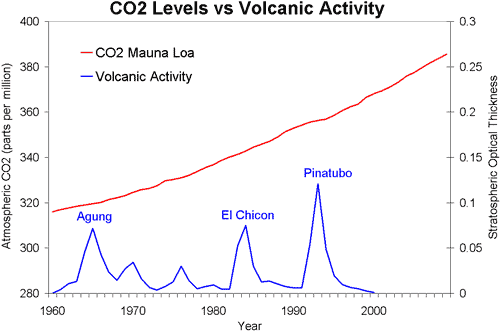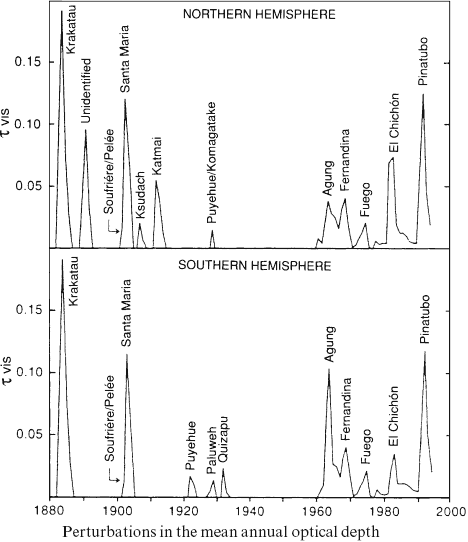Two attempts to blame global warming on volcanoes
Posted on 18 January 2010 by John Cook
There are a number of skeptic arguments against man-made global warming, many of which are mutually exclusive. You can't blame global warming on the sun one day, El Nino the next day and CFCs the day after, all the while claiming global cooling is occuring although this is in doubt because of suspect surface measurements. One hat thrown into the ring of global warming culprits is volcanoes. In fact, there are two volcano arguments, each mutually exclusive. One alternative is that volcanoes emit more CO2 than humans. The other is that a drop in volcanic activity caused global warming. So both volcanic activity and a lack of volcanic activity causes global warming. Way to cover your bases!
First, let's look at the argument that volcanoes emit more CO2 than humans. Volcanoes emit CO2 both on land and underwater. Underwater volcanoes emit between 66 to 97 million tonnes of CO2 per year (Morner 2002). However, this is balanced by the carbon sink provided by newly formed ocean floor lava. Consequently, underwater volcanoes have little effect on atmospheric CO2 levels. The greater contribution comes from subaerial volcanoes (subaerial meaning "under the air", refering to land volcanoes). Subaerial volcanoes are estimated to emit 242 million tonnes of CO2 per year (Morner 2002).
In contrast, humans are currently emiting around 29 billion tonnes of CO2 per year (EIA). In other words, human CO2 emissions are over 100 times greater than volcanic emissions. This is apparent when comparing atmospheric CO2 levels to volcanic activity since 1960. Even strong volcanic eruptions such as Pinatubo (which emitted around 42 million tonnes of CO2) had little discernable impact on CO2 levels. In fact, the rate of change of CO2 levels actually drops slightly after a large volcanic eruption, possibly due to the cooling effect of aerosols.

Figure 1: Atmospheric CO2 levels measured at Mauna Loa, Hawaii (NOAA) and Stratospheric Aerosol Optical Thickness, a measure of volcanic activity (NASA GISS).
In fact, the cooling effect of a volcanic eruption leads to the second argument of how a drop in volcano caused global warming. Volcanoes emit sulfate aerosols which reflect incoming sunlight, cooling the planet. A large volcanic eruption such as the Pinatubo eruption in 1991 can have a global cooling effect of 0.1°–0.3°C for several years (Robock 1994, Zielinski 2000). However, mega-eruptions or a series of large eruptions can have a cooling effect that take decades to wear off, giving a perceived warming effect. Zielinski 2000 studies past volcanoes, particularly over the past few centuries:

Figure 2: Changes in optical depth from 1880 to 2000.
Zielinksi concluded "the lack of any climatically effective volcanism in the period 1920s to early 1950s undoubtedly contributed to the overall warm conditions during those decades." (Zielinski 2000). This is confirmed by Hegerl 2003 who found that "early 20th century warming is attributed to a composite of greenhouse warming, an uncertain contribution from solar forcing, and a recovery from a previous period of heavy volcanism".
Similarly, Bertrand 1999 found that "the lack of volcanism during the period 1925-1960 could account, at least partly, for the observed warming trend in this period". Bertrand was investigating the effect of solar and volcanic influence on climate and concluded "these are clearly not sufficient to explain the observed 20th century warming and more specifically the warming trend which started at the beginning of the 1970s".
In short, a lack of volcanic activity had some part in temperature rise over the first half of the 20th century. However, it has had little to no part in the modern global warming trend that began in the 1970's. On the contrary, relatively frequent volcanic activity in the late 20th century may have masked some of the warming caused by CO2.
So we have two skeptic arguments seeking to blame global warming on volcanoes. One says volcanic activity caused global warming. The other says a lack of volcanic activity caused global warming. The two arguments have one thing in common - they're both woefully inadequate in establishing a link between volcanoes and the last few decades of global warming.































 Arguments
Arguments






























JohnSeers @49... I've heard that one many times before, at least relative to rising atmospheric CO2. What those who make that claim fail to recognize is that CO2 from underwater volcanoes would merely be dissolved into seawater before reaching the surface. It would lead to greater ocean acidification but any atmospheric changes would be limited to the second order effect from changes in the ocean/atmosphere exchange of CO2.
This argument seems more of a "what if" argument someone made up, didn't research, and spun up into a new denial theory.
JohnSeers @49,
In addition to the responses by Bob and Rob I suggest that the following fairly obvious questions, with fairly obvious answers, are raised by that 3rd volcanic impact possibility:
The idea of heating the oceans from below has so many things wrong it. Firstly, I highly recommend Bob's link to get a feel for the scale of different heat sources. Secondly, consider the vertical temperature profile of the oceans - rather consistant with heating from above not below wouldnt you think? And finally, to explain the rapid rise in ocean heat content, this is postulating the amount of heat being emitted geothermally has dramatically increased in recent years and yet is undetectable by observations of volcanism and vertical ocean temperature profiling. This is all about ignoring the simple, obvious explanation which is consistant with all of other data (adding CO2 to atmosphere from burning fossil fuels) and going for the extremely improbable, supported by no evidence at all, presumably because the likely explanation is unpalatable. I dont believe this is rational thinking.
I had presumed that JohnSeers' question @ 49 was with respect to the direct heating effects of undersea volcanoes, rather than any indirect effects associated with CO2 emissions, etc.
Oceans are an important mechanism of heat transfer. Globally, tropical and subtropical regions absorb much more solar radiation than they emit back to space, so they show a net gain via radiation. Polar and sub-polar regions are the opposite - they lose more by IR emission to space than they absorb from solar radiation.
The climate system re-balances those regions of gain/loss by transporting energy poleward, and this happens via circulation in both the atmosphere and the oceans. Ocean currents such as the Gulf Stream, etc. move large amounts of energy.
And both land areas and ocean floors show vertical heat transport from the interior of the earth to the surface - but as discussed in the link I gave in comment #50, the amounts are small. And as pointed out in comments, to argue that current surface warming is the result of this flux of heat from the earth's core (via volcanoes or regular conduction) would require massive undetected increases in that geothermal heat flux.
Ain't happening, and anyone arguing that it is (without evidence) can be assumed to be badly uninformed (or mis-informed).
Bob Loblaw @54,
I agree that JohnSeers was seeking a debunking of the claim that the evidence of significant rapid recent climate system changes was significantly due to underwater volcanoes heating the oceans.
I think it could be helpful to always clarify a 'climate change' question or claim in the context of 'its significance related to the evidence of significant rapid recent climate system changes'. And there are 2 dominant verifiable (real based on evidence) rapid recent changes:
The evidence and developed understanding to date is so robust that it is very unlikely that fossil fuel use is not the dominant cause of those verifiable rapid recent changes.
As your helpful comment confirms, that part of the science is almost as certain as science can get on any matter (part of the reason many IPCC participants see no value in 'another update'). That leads to misleading political actions hoping to benefit from the popularity of limited awareness and related increased misunderstanding which is limitless. Verifiable evidence always limits the range of believable explanations ...